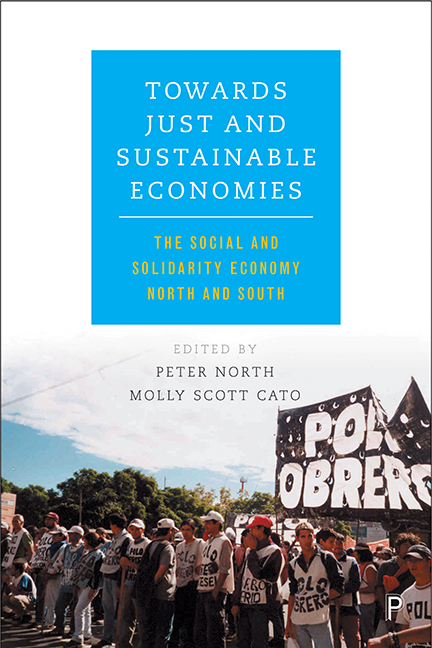Book contents
- Frontmatter
- Dedication
- Contents
- List of figures and tables
- Notes on contributors
- Acknowledgements
- One Introduction: new economies North and South – sharing the transition to a just and sustainable future
- Part I Theoretical perspectives on the social and solidarity economy
- Part II The social and solidarity economy as a site of social innovation
- Part III The social and solidarity economy and the state
- Part IV Policy translation between North and South
- Index
One - Introduction: new economies North and South – sharing the transition to a just and sustainable future
Published online by Cambridge University Press: 05 April 2022
- Frontmatter
- Dedication
- Contents
- List of figures and tables
- Notes on contributors
- Acknowledgements
- One Introduction: new economies North and South – sharing the transition to a just and sustainable future
- Part I Theoretical perspectives on the social and solidarity economy
- Part II The social and solidarity economy as a site of social innovation
- Part III The social and solidarity economy and the state
- Part IV Policy translation between North and South
- Index
Summary
The solidarity economy as an economy of hope
The globalised neoliberal economy encapsulated by the Washington Consensus and Fukuyama's famous (1992) declaration that the global acceptance of free markets and democracy has meant that we have reached the ‘end of history’ is increasingly beleaguered. Facing financial collapse on the one hand, and criticism for its failure to respond to social and environmental crises on the other, its central tenets are in need of radical reorientation. A new paradigm is developing – one that combines a commitment to social justice and a respect for the rights of other species, future generations and planetary limits. This will not be a new mono-cultural economy, but a diverse system of economies, within an overarching framework of social and environmental justice.
The emergence of movements as disparate as Occupy, Los Indignados, Transition initiatives, Momentum, Barcelona en Comú and Syriza is a recognition that the neoliberal economy that has been hegemonic, at the level of discourse at least, since the 1980s has not delivered the goods. It led to Latin America's ‘lost decade’ in the 1980s and to the global financial crisis of 2007–08, which has resulted in long-term austerity in many Eurozone countries. Worse, the urgency of the need to avoid dangerous climate change and the depletion of the core resources that fuel human development have not been recognised. This ‘triple crisis’ has called into question the extent to which growthfocused capitalist economies built on the huge throughput of resources can continue: is another economy both necessary and possible? Does the climate crisis ‘change everything’ or is this the latest version of capitalist crisis that is affecting, for example, what Paul Mason (2012) has identified as the ‘student without a future’ for whom capitalism is failing to provide a decent income and security? The shout ‘Basta!’ (‘Enough!’) emerging from Buenos Aires, Athens, Barcelona, Cairo, London and thousands of other places signals that the capitalist and climate crisis is a crisis of civilisation that means that for many it is, today, impossible to live a life with dignity.
- Type
- Chapter
- Information
- Towards Just and Sustainable EconomiesThe Social and Solidarity Economy North and South, pp. 1 - 12Publisher: Bristol University PressPrint publication year: 2017

